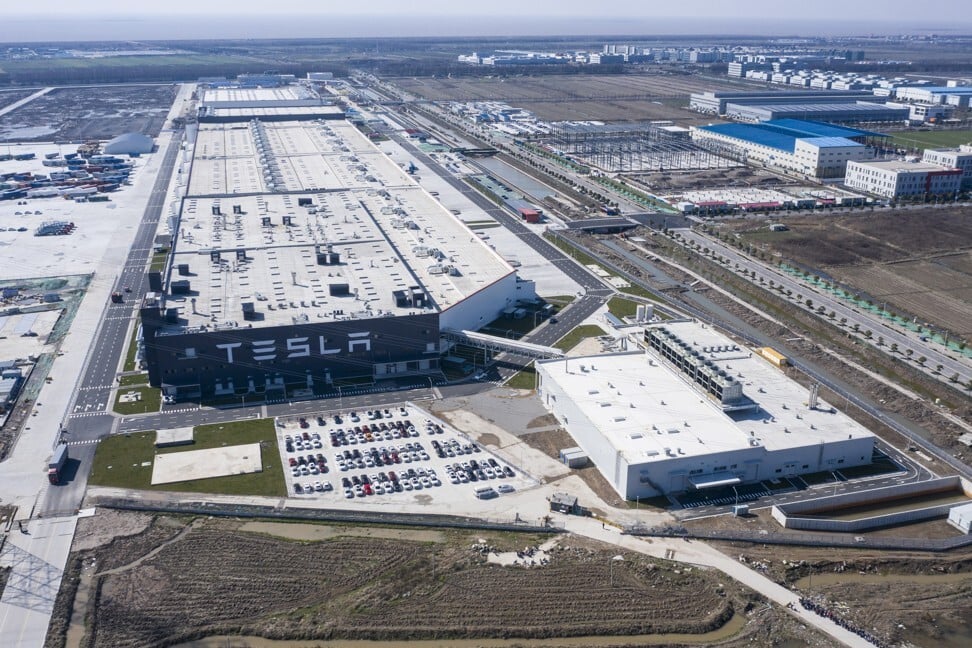
Tesla raises Model 3 sticker price in China after government kicks off three-year plan to rein in rebates to spur competition
- A Tesla Standard Range Model 3 sedan, assembled at the carmaker’s Gigafactory 3 in Shanghai, will now carry a sticker price of 303,550 yuan (US$42,874), compared with 299,050 yuan a week ago
- The Long Range Model 3 will be priced 1.5 per cent higher at 344,550 yuan when it arrives in showrooms in June, according to Tesla’s website

Tesla raised the starting price of its bestselling electric car in China, reversing its price cuts in the past few months after the Chinese government kicked off a three-year plan to scale back subsidies on new-energy vehicles.
A Tesla Standard Range Model 3 sedan, assembled at the carmaker’s Gigafactory 3 in Shanghai, will now carry a sticker price of 303,550 yuan (US$42,874), compared with 299,050 yuan a week ago. The Long Range Model 3 will be priced 1.5 per cent higher at 344,550 yuan when it arrives in showrooms in June, according to Tesla’s website.
The increases are a direct reaction to yesterday’s announcement of a 300,000 yuan cut-off for electric cars to qualify for rebates from the Ministry of Finance. Subsidies will be trimmed by 10 per cent this year, cut by 20 per cent in 2021, and reduced by 30 per cent in 2022 according to the ministry, in a plan to spur local manufacturers to innovate and compete against petrol guzzlers and imported marques.
“The price rise will have only a short-term impact on Tesla’s sales,” said Tian Maowei, sales manager at Yiyou Auto Service in Shanghai. “An extra 4,500 yuan will not be enough to make those middle-class buyers change their minds if they are fans of Tesla cars.”

China’s rebates on electric vehicles were first introduced a decade ago to nurture local assemblers, a strategy that has turned the largest vehicle market on the planet into the biggest for new-energy cars. Subsidies initially lopped as much as 60,000 yuan from a vehicle’s price tag, excluding any extra goodies thrown in by local authorities to support their hometown industries.
The EV sector is also one of the key areas that Beijing wants local manufacturers to catch up with the global leaders in terms of technological standards, a vision etched in the ambitious “Made in China 2025” industrial strategy.
Tesla, which began making Model 3 cars at its US$2 billion Gigafactory 3 in Shanghai, had been on the receiving end of the Chinese government’s largesse, including loans by state-owned banks at preferential rates, and up to 25,000 yuan per vehicle in subsidies. Imported Model 3 cars used to cost up to 377,000 yuan before Tesla’s first overseas plant was erected at the Lingang free-trade zone. With the local assembly and after the government’s rebate, a Model 3 would cost 20 per cent less than the imported model at 299,050 yuan.
The price difference gave Tesla a leg up, giving the carmaker a bumper month in March, with 10,160 vehicles delivered or a quarter of the electric car market, outselling every other new-energy vehicle (NEV) maker in the country, according to the China Passenger Car Association (CPCA), an industry guild that compiles monthly sales data.
Tesla aims to assemble 150,000 cars in Shanghai, which would put it on track to increase its market share to 30 per cent this year, according to a forecast by the CPCA’s secretary general Cui Dongshu.
The carmaker could keep its prices and costs low by using more China-made components, thereby making itself more competitive in the world’s largest vehicle market, China International Corporation (CICC) said in a research report.